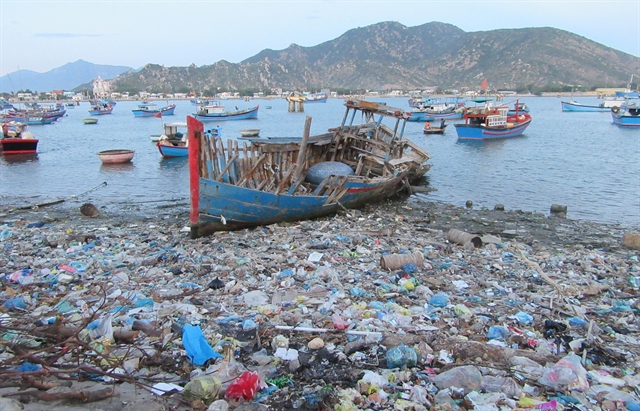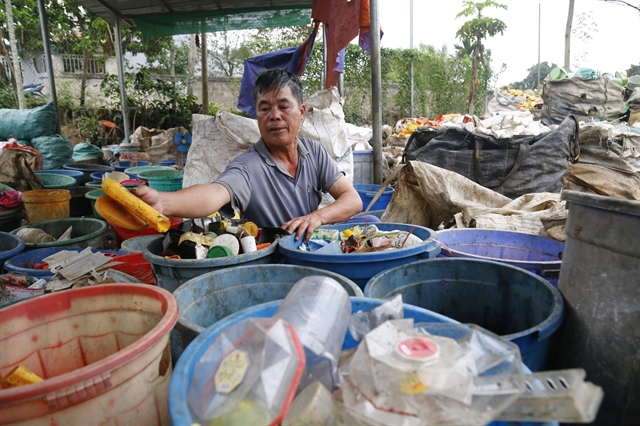.jfif) Opinion
Opinion


|
| Hồ Hữu Huy, advisor for the development of global plastic policy of the World Wild Fund for Nature (WWF) in Việt Nam. — Photo courtesy of WWF |
Việt Nam has been recognised as a pioneering country in developing a global treaty to reduce plastic, joining 175 countries in adopting a resolution at the United Nations Environment Assembly (UNEA) on ending plastic pollution and building a global treaty by 2024.
Hồ Hữu Huy, an advisor for the development of the global plastic policy of the World Wild Fund for Nature (WWF) in Việt Nam, spoke with Tài Nguyên & Môi Trường (Natural Resources & Environment) online newspaper about the country's advantages in negotiating the treaty to shape a sustainable future for plastic.
Could you please tell us the basic contents of Resolution 5/14, which was adopted at the fifth session of the UNEA-5 on the global treaty on addressing plastic pollution?
Resolution 5/14, entitled "Ending plastic pollution: Towards a legally binding international instrument", was officially adopted by the UNEA this March. It highlights the importance of the effects of plastic pollution globally, as well as the concern of all countries about the harmful effects of plastic pollution on the environment and human health. Evidence and discussion over the years show that global legislation is needed to tackle the issue thoroughly and effectively.
In its decision-making section, the resolution proposes that the UNEA's Executive Director convene the Intergovernmental Negotiating Committee (INC) to develop a legally binding international instrument on plastic pollution, including the marine environment. The INC started working in the second half of this year and planned to complete the work by the end of this year. And so the treaty may be officially signed in 2025.
Some highlights in the resolution's content can be pointed out as follows. Firstly, the resolution addresses the circular economy, the whole life cycle approach of plastics, and sustainable production and consumption activities, so the negotiation content will range from product design to waste management.
Secondly, the resolution emphasises the importance of promoting the sustainable design of products and materials so that they can be reused, recycled, and retained in the economy for as long as possible to save resources and reduce waste. The most important thing is reducing the amount of waste, not just focusing on waste management.
Finally, the resolution recognises the important contribution of the informal sector to the collection, segregation and recycling of plastics in many countries and encourages action from all stakeholder groups, including the private sector.
What should Việt Nam pay attention to when negotiating a global treaty on plastic pollution to ensure a substantive and enforceable treaty?
Prime Minister Phạm Minh Chính has issued Decision 1407 on Việt Nam as a pioneer country in the region in solving plastic waste, contributing to building and implementing a circular economy model with effective plastic management. This is a good start for the country in the negotiation process.
One of the key points of developing this treaty is concretising the obligations and actions of member countries. Suppose the treaty only sets out a series of far-fetched goals for reducing plastic pollution instead of specifying policies for countries to implement. In that case, it will increase the financial burden on countries desiring to protect the environment but having limited resources. This cannot guarantee that all countries will jointly develop effective solutions to achieve common global goals.
Therefore, the matter is that the performance of common obligations must go hand in hand with resource sharing and implementation support.

|
| Garbage is dumped on Đầm Nại lagoon in the central coastal province of Ninh Thuận. VNA/VNS Photo Nguyễn Thành |
Việt Nam has been taking specific actions to tackle plastic pollution, such as developing a roadmap to ban certain single-use plastic products, a roadmap for circular economy development in the plastic industry, building and implementing the policy framework of expanded responsibility of manufacturers, initially implementing activities to upgrade the waste management system such as piloting waste separation at source.
If Việt Nam continues to expand and synchronise these policies following the treaty's framework after signing, we'll need supportive mechanisms from international resources to implement the treaty.
As we can see, a number of the resolution's policy options can be made globally, including obligations to reduce and ban certain unnecessary or especially hazardous plastic products or product design standards. However, when comparing these policy scenarios, it should be noted what the advantage for Việt Nam will be if the global policy is not synchronised with the national policy and what kind of supportive resources the country will need. This information will help Việt Nam develop its negotiating positions and locate specific proposals for the policies negotiated in the treaty.

|
| A resident of the northern province of Tuyên Quang earns an average income of VNĐ4.5 million to 6 million a month from collecting and sorting trash. VNA/VNS Photo Nam Sương |
What support will WWF offer in the coming time to help Việt Nam increase its resources and negotiating and enforcement capacity?
WWF will continue its current cooperation with the Ministry of Natural Resources and Environment and relevant ministries and sectors in tackling plastic pollution in Việt Nam.
Domestic policies related to reducing and banning certain single-use plastic products, expanding producers' responsibilities, developing a circular economy, and encouraging sustainable production and consumption, which WWF has had the opportunity to cooperate with and support in the development in the past time, will be an important premise for the continuation, replication and synchronisation with international policies when Việt Nam joins the treaty on plastic pollution.
Pilot activities on changing single-use plastic consumption habits, promoting reuse and eco-friendly alternatives, and efficient waste separation and management, which we work with localities, will help provide practical perspectives and lessons on effective implementation of the plastic management changes that the treaty will require countries to implement.
In addition, WWF globally and in Việt Nam will continue to conduct in-depth studies on policy recommendations to ensure the success and effectiveness of the treaty, create opportunities and regional policy forums for countries to share successful lessons and discuss views, parallel with the negotiation process in the next two years. — VNS




